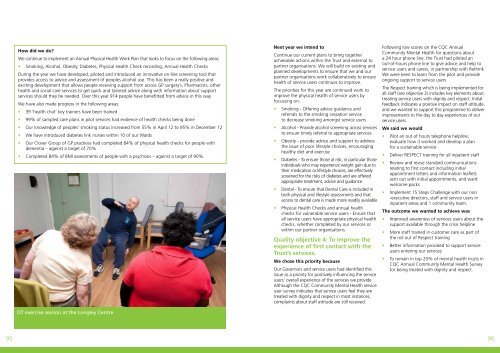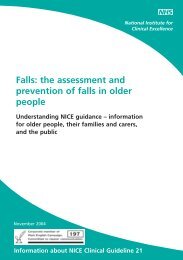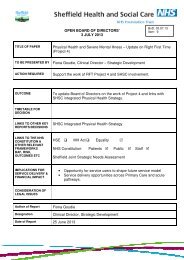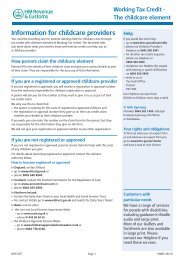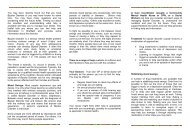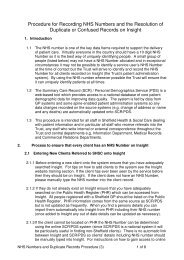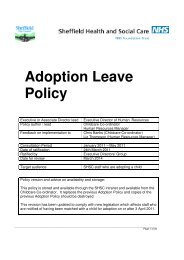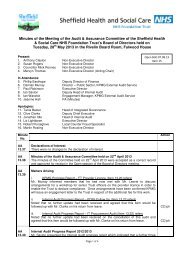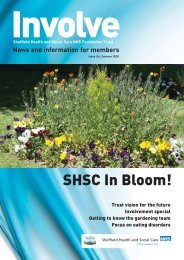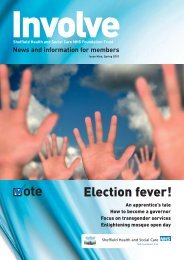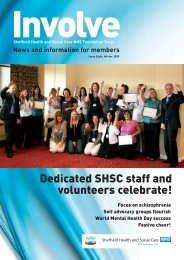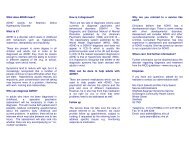Item 8 - Sheffield Health and Social Care
Item 8 - Sheffield Health and Social Care
Item 8 - Sheffield Health and Social Care
Create successful ePaper yourself
Turn your PDF publications into a flip-book with our unique Google optimized e-Paper software.
How did we do?We continue to implement an Annual Physical <strong>Health</strong> Work Plan that looks to focus on the following areas:• Smoking, Alcohol, Obesity, Diabetes, Physical <strong>Health</strong> Check recording, Annual <strong>Health</strong> ChecksDuring the year we have developed, piloted <strong>and</strong> introduced an innovative on-line screening tool thatprovides access to advice <strong>and</strong> assessment of peoples alcohol use. This has been a really positive <strong>and</strong>exciting development that allows people receiving support from across GP surgery’s, Pharmacists, otherhealth <strong>and</strong> social care services to get quick <strong>and</strong> tailored advice along with information about supportservices should they be needed. Over this year 914 people have benefitted from advice in this way.We have also made progress in the following areas:• 39 ‘health chat’ key trainers have been trained• 99% of sampled care plans in pilot services had evidence of health checks being done• Our knowledge of peoples’ smoking status increased from 55% in April 12 to 95% in December 12• We have introduced diabetes link nurses within 10 of our Wards• Our Clover Group of GP practices had completed 84% of physical health checks for people withdementia – against a target of 70%• Completed 84% of BMI assessments of people with a psychosis – against a target of 90%.OT exercise session at the Longley CentreNext year we intend toContinue our current plans to bring togetherachievable actions within the Trust <strong>and</strong> external topartner organisations. We will build on existing <strong>and</strong>planned developments to ensure that we <strong>and</strong> ourpartner organisations work collaboratively to ensurehealth of service users continues to improve.The priorities for this year are continued work toimprove the physical health of service users byfocussing on:• Smoking - Offering advice guidance <strong>and</strong>referrals to the smoking cessation serviceto decrease smoking amongst service users• Alcohol - Provide alcohol screening across servicesto ensure timely referral to appropriate services• Obesity - provide advice <strong>and</strong> support to addressthe issue of poor lifestyle choices, encouraginghealthy diet <strong>and</strong> exercise• Diabetes - To ensure those at risk, in particular thoseindividuals who may experience weight gain due totheir medication or lifestyle choices, are effectivelyscreened for the risks of diabetes <strong>and</strong> are offeredappropriate treatment, advice <strong>and</strong> guidance• Dental - To ensure that Dental <strong>Care</strong> is included inboth physical <strong>and</strong> lifestyle assessments <strong>and</strong> thataccess to dental care is made more readily available• Physical <strong>Health</strong> Checks <strong>and</strong> annual healthchecks for vulnerable service users - Ensure thatall service users have appropriate physical healthchecks, whether completed by our services orwithin our partner organisations.Quality objective 4: To improve theexperience of first contact with theTrust’s services.We chose this priority becauseOur Governors <strong>and</strong> service users had identified thisissue as a priority for positively influencing the serviceusers’ overall experience of the services we provide.Although the CQC Community Mental <strong>Health</strong> serviceuser survey indicates that service users feel they aretreated with dignity <strong>and</strong> respect in most instances,complaints about staff attitude are still received.Following low scores on the CQC AnnualCommunity Mental <strong>Health</strong> for questions abouta 24 hour phone line, the Trust had piloted anout-of-hours phone line to give advice <strong>and</strong> help toservice users <strong>and</strong> carers, in partnership with Rethink.We were keen to learn from the pilot <strong>and</strong> provideongoing support to service usersThe Respect training which is being implemented forall staff (see objective 2) includes key elements abouttreating service users with dignity <strong>and</strong> respect. Initialfeedback indicates a positive impact on staff attitude,<strong>and</strong> we wanted to support this programme to deliverimprovements to the day to day experiences of ourservice users.We said we would• Pilot an out of hours telephone helpline,evaluate how it worked <strong>and</strong> develop a planfor a sustainable service• Deliver RESPECT training for all inpatient staff• Review <strong>and</strong> revise st<strong>and</strong>ard communicationsrelating to first contact including initialappointment letters <strong>and</strong> information leafletssent out with initial appointments, <strong>and</strong> wardwelcome packs• Implement 15 Steps Challenge with our non-executive directors, staff <strong>and</strong> service users ininpatient areas <strong>and</strong> 1 community team.The outcome we wanted to achieve was• Improved awareness of services users about thesupport available through the crisis helpline• More staff trained in customer care as part ofthe roll out of Respect training• Better information provided to support serviceusers entering our services• To remain in top 20% of mental health trusts inCQC Annual Community Mental <strong>Health</strong> Surveyfor being treated with dignity <strong>and</strong> respect.9596


